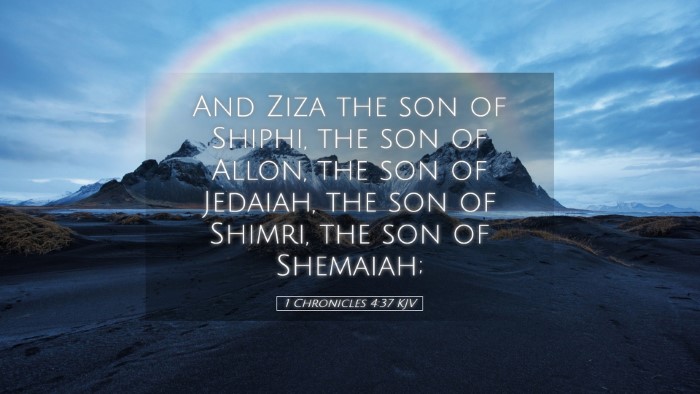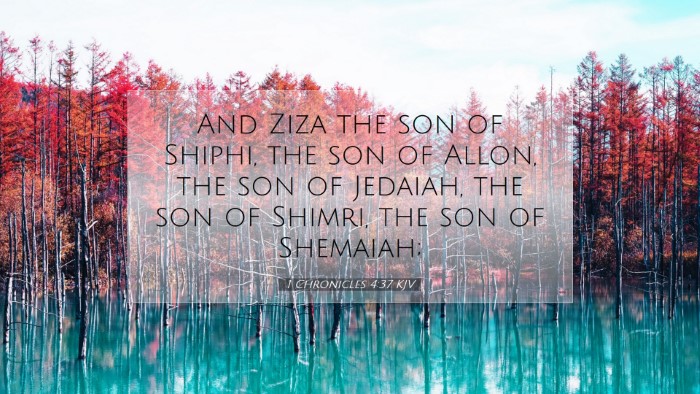Commentary on 1 Chronicles 4:37
Verse: 1 Chronicles 4:37 - “And Ziza the son of Shiphmi, the son of Mahlah, the son of Hushim.”
Introduction
The passage in 1 Chronicles 4:37 mentions Ziza, a figure who appears in a genealogical context, reflecting the importance of lineage in the biblical narrative. Chronicles, commonly associated with the work of Ezra, often emphasizes the genealogies to reaffirm the covenantal promises of God to Israel. As such, even passages that may seem mundane or repetitious are laden with theological significance and ancestral pride.
Genealogical Significance
Matthew Henry's Insight: Matthew Henry emphasizes the importance of genealogical records, not just as a means of tracing lineage but as a declaration of God's faithfulness to His promises. In Israelite culture, ancestry provided a sense of identity and belonging. The genealogy of Ziza serves to remind readers of the continuity of God's covenantal promise through generations.
Albert Barnes Commentary: Barnes elaborates on the genealogy approach in the Chronicles, supporting the assertion that these records were of significant public interest, as they demonstrated how God's plan unfolded through each family line. Here, mention of Ziza, a lesser-known figure, suggests that every individual, no matter how obscure, plays a role in God's greater narrative.
Adam Clarke's View: Clarke highlights that genealogies serve as a reminder of God's providence and meticulous care over His people, aligning with the biblical theme that every life is significant in the unfolding of divine history. Ziza’s inclusion, albeit brief, indicates God's recognition and ultimate plan for each descendant.
Theological Themes
The simple mention of Ziza allows us to explore deeper themes of faithfulness, identity, and God’s overarching plan in biblical history.
Faithfulness of God
Matthew Henry:** Henry notes that every name in these genealogies represents a life touched by God’s mercy and grace. The presence of Ziza’s name in the lineage illustrates the enduring promises of God, which are fulfilled through generations. It reflects the depths of God’s compassion and the fulfillment of promises made to Abraham, Isaac, and Jacob.
Identity and Heritage
Albert Barnes:** Identity plays a crucial role in biblical culture. The mention of Ziza is not merely a listing of names but an affirmation of heritage. Each name contributes to the narrative of a community, and for the Israelites, this was a powerful reminder of their identity as God’s chosen people.
God's Providential Plan
Adam Clarke:** Clarke points out that references to individuals serve to highlight that God's plan involves each person, regardless of their prominence or lack thereof in human history. Ziza’s inclusion may prompt the readers to meditate on how they, too, fit into a divine narrative, fostering a sense of purpose.
Practical Applications
Looking beyond the genealogical aspect, 1 Chronicles 4:37 can inspire contemporary believers in several ways:
- Inheritance of Faith: Just as Ziza is part of a lineage, believers today recognize their spiritual heritage. The importance of passing down faith and values to future generations is paramount.
- Value of Every Individual: In God’s economy, each life has intrinsic value. The mention of an otherwise obscure character reminds us that everyone contributes to the community of faith.
- Encouragement in Obscurity: Many believers may feel sidelined or underappreciated. Ziza’s mention validates the notion that God sees all contributions, evident or hidden, in His kingdom work.
- Covenantal Faithfulness: Understanding that God’s promises transcend generations instills hope and perseverance in believers as they witness God's ongoing work in their lives and their communities.
Conclusion
In summary, 1 Chronicles 4:37 offers profound insights despite its brevity. The verse not only marks a genealogical entry but also embodies key theological motifs: God’s faithfulness, the importance of heritage, and the significance of each individual in the unfolding story of salvation. By heeding the complex yet beautiful narrative laid forth in such genealogies, pastors, students, theologians, and Bible scholars can glean vital truths that enhance their understanding of Scripture and enrich their spiritual journeys.


